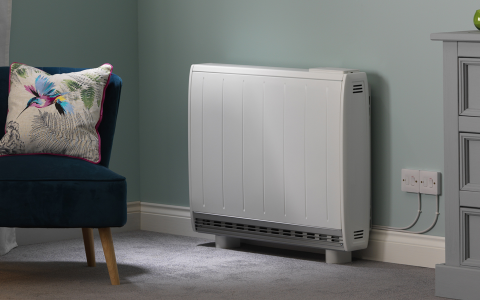
Overcoming overheating in large urban developments with hot water heat pump solutions
The building regulations recognise the importance of taking steps to mitigate the effects of overheating and introduced a new Approved Document called Part O.
In this blog we look at the important role that HVAC solutions can play in reducing overheating and explain why selecting hot water heat pumps is so effective in large urban developments.

Overcoming overheating in large urban developments with hot water heat pump solutions
The Climate Change Committee (CCC) report in July 2022[1]highlighted the impact of rising temperatures on overheating in buildings that are already being felt in the UK today. Especially summer overheating in buildings is closely linked with higher outdoor temperatures. The CCC report states that ‘hot’ summers such as those felt in 2018 will become the average summer by 2050 and that buildings in cities are at a much greater risk of overheating, with urban islands being typically 5°C warmer than surrounding areas. The recent introduction of a new Approved Document Part O covers the requirement to mitigate overheating in buildings. It brings into focus the key role that HVAC solutions, including hot water heat pumps, can play in tackling overheating in large urban developments.
Overheating in buildings as covered by Part O is linked to two other parts of the Building Regulations: Part F (ventilation) and Part L (conservation of fuel and power). In the Future Homes Standard (FHS), the next proposed change to the building regulations which is currently due in 2025, Parts O, F and L will all change and form a group of regulations that work together with the aim to deliver healthier and more energy efficient buildings.
[1] Climate Change Committee July 2022 ‘Risks to health, wellbeing and productivity from overheating in buildings’

How can hot water heat pumps help to mitigate overheating in large urban developments?
Hot water heat pumps, especially when specified with electric panel heaters, can mitigate overheating in large urban developments by removing a high-temperature heat interface units and a hydronic distribution system that contributes to overheating. To understand why this is the case, it is worth revisiting the Climate Change Committee report where it looks at building types in a section called ‘Overheating in the UK today’. The report states “some building types, such as flats, tend to have a risk of overheating and there can be increased risk of overheating in some more energy efficient buildings”.
One of the reasons for this is that apartment buildings can have centralised heating sources where the hot water is sent to each apartment via a network of pipes. The more pipes there are, regardless of the level of insulation, the higher the risk that latent heat from the pipes will contribute to overheating in communal spaces but also in individual apartments. The highly insulated and thermally efficient building fabric required by the current version of Part L 2021 will exacerbate the issue by retaining this heat within the building.
When a hot water heat pump is coupled with an electric direct acting panel heater, this all-electric HVAC solution removes any need for the installation of a centralised hydronic system. This further reduces the overheating contribution of latent heat on the building.
The need to create comfortable indoor environments by specifying solutions that can mitigate the effects of overheating is a pressing one, due to the adverse health impacts that can result. The CCC report highlights this in its report by stating ‘High temperatures cause a range of negative health impacts in addition to discomfort. For the most vulnerable, high temperatures can lead to death. There was significant excess mortality during each of the heatwave periods from 2018 to 2021’.
Dimplex have a range of low-carbon HVAC solutions such as hot water heat pumps and ambient loops, that can help to mitigate overheating and satisfy the requirements of Part O. If you have a large urban development project and you would like to explore how our highly efficient HVAC solutions can help meet your compliance requirements, please contact our design team today.











